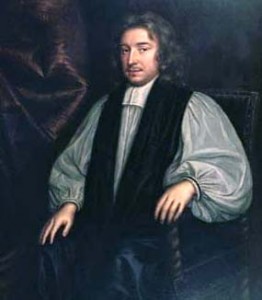
John Wilkins was born in 1614 to Walter and Jane Wilkins in Northamptonshire. After his father’s death, Wilkin’s mother married Francis Pope, and they had a son, Walter, who would later become successor to Christopher Wren. Wilkins graduated at New Inn Hall, Oxford in 1627, after which he proceeded to Magdalen Hall where he earned his BA and MA (in 1631 and 1634 respectively). Wilkins leaves Oxford in 1637 following the introduction of Laudian Arminianism at Magalen Hall. He then began a period in which he served as a priest, and by 1641 Wilkins was the private chaplain to George, eighth Lord Berkely in London. In 1644 he enters service for Charles Louis, but this arrangement seems to stem from a congruent interest in science rather than religion. Finally, in 1645 he was appointed preacher at Gray’s Inn and the following year writes Ecclesiastes: A Discourse Concerning the Gift of Preaching.
Wilkins’ scientific interests varied widely. He published The discovery of a new world, or, A discourse tending to prove, that (‘tis probable) there may be another habitable world in the moon in 1638. Wilkin’s interest in life on other planetary bodies is part of a larger debate in the sixteenth and seventeenth centuries, which became a pressing issue following Copernicus’, Galileo’s, and Kepler’s work in astronomy and the solar system. Two years later he published Discourse concerning a new planet; tending to prove, that (‘tis probable) our earth is one of the planets adding to the debate between religion and the new model of the solar system. In 1641 Wilkins begins an interest in language and communication with his book Mercury, or, The secret and swift messenger: shewing how a man may with privacy and speed communicate his thoughts to a friend at any distance where he briefly considers a universal language, an idea that to which he returns later in life. Around this time, Wilkins helps develop a group devoted to scientific pursuits and anticipates the Royal Society, but disbands in 1648. That same year he publishes his practical guide to geometrical mechanics: Mathematical Magick, or, The Wonders that may be Performed by Mechanical Geometry.
In 1648 Wilkins is chosen to be the warden of Wadham, during which time, the school flourished, in part because of his accommodating policies. His tenure at Wadham attracted many prominent figures like Seth Ward, Christopher Wren, his stepbrother, Walter Pope, and Thomas Sprat among others. Robert Boyle and Jonathan Goddard moved to Oxford to attend his scientific meetings. In 1652 Wilkins is appointed to a committee of five men to whom Cromwell delegates several of his powers as chancellor. During this time, he continued to write and publish on religion continuing many of the themes he established in his early work, Ecclesiastes.
After the restoration, Wilkins did not participate in ecclesiastical politics, perhaps because both extremes viewed him as a turncoat. However, he is one of the first fellows elected to the Royal Society in 1663, and serves as one of its two secretarial positions. Wilkins not only actively participates in meetings and the society’s scientific efforts, but also works as an administrator and fundraiser, and later supervises Thomas Sprat’s History of the Royal Society. Around this time, Wilkins begins his most notable work: Essay towards a Real Character and a Philosophical Language, which is published in 1668. With increasing international contact, Wilkins calls for a universal language, and one that more systematically organizes communication. Though Wilkins rejects the idea, some believed that the project could rediscover the adamic language of Eden. Wilkins runs into problems with his project, however, when he loses all his belongings and papers in the great fire of London, after which he receives more help from the Royal Society to finish his project.
In 1672 he dies of what is said to be a “fits of stone” in the house of his step-daughter, Elizabeth Frensh, and his son-in-law, John Tillotson. Having contributed to theology, science, mechanics, mathematics, and a number of social mechanisms that promoted all of these, Wilkins proves himself to be a central figure in the cultural developments over the course of the seventeenth century.
D. Geoffrey Emerson
Works Cited
Henry, John. ‘Wilkins, John (1614–1672)’. Oxford Dictionary of National Biography. Oxford University Press, 2004; online edn, Oct 2009 [http://www.oxforddnb.com/view/article/29421, accessed 22 Sept 2014]